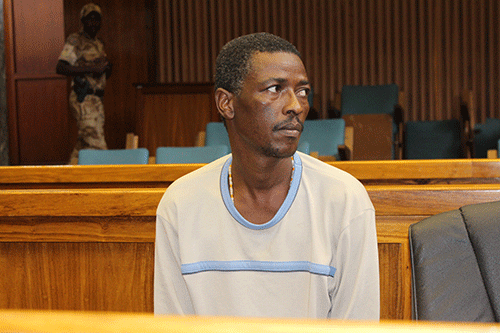Chief Justice Peter Shivute, in concurrence with judges of appeal Sylvester Mainga and Dave Smuts, yesterday increased a convicted child molester’s sentence from an initial eight years to an effective 18 years.
Bertus Koch (47) was sentenced in 2018 to eight years on five counts of trafficking in children and five counts of committing or attempting to commit a sexual act with a child under the age of 16 years.
He was sentenced to five years on each of the trafficking counts, with one year suspended for five years, and with three of the sentences to run concurrently with the other two. On the sexual act counts, he was sentenced to one year on each count, to run concurrently with the one of the trafficking charges, leaving him with an effective eight years imprisonment.
The State, not happy with the rape acquittal and the sentences, applied for leave to appeal to the Supreme Court, but Judge President Petrus Damaseb, who presided over the matter, refused, saying in his view, the Supreme Court would not come to a different conclusion.
However, on a petition to the Chief Justice, the appeal was allowed. The State, represented by Innocencia Nyoni, argued that Damaseb erred in concluding that the State did not discharge its onus beyond a reasonable doubt in respect of the rape charges and that the sentence imposed was startlingly lenient, disproportionate to the crimes, and did not take into account the interests of society.
In its judgement, the Supreme Court endorsed the findings of Damaseb that the State did not prove its case beyond reasonable doubt, and that Koch was entitled to the benefit of doubt.
With regards to the sentence, Judge Shivute said the court is in agreement with the State that the sentences imposed were inappropriate in the circumstances, and had to be increased.
According to the Supreme Court, the material inconsistencies and contradictions in the testimonies of the minor complainants did not sustain a conviction of rape.
“I am alive to the fact that the complainants were children of a tender age and, therefore, their power of memory and their ability to narrate events accurately and consistently may not be the same as that of an adult. However, the evidence is too tenuous to meet the standard of proof in a criminal case. It simply does not constitute proof beyond reasonable doubt,” Chief Justice Shivute, who wrote the judgement, stated.
With regards to the sentencing, the Supreme Court agreed with the State that the sentences imposed were startlingly lenient in the circumstances. According to them, Koch took advantage of the complainant’s unfortunate circumstances to groom them for sexual exploitation.
“It was a cowardly and deeply distressing targeting of the most innocent and vulnerable in a community, children,” the judges emphasised.
Chief Justice Shivute further said that he is of the considered view that the sentencing court had given more weight to the personal circumstances of Koch at the expense of other factors such as the seriousness of the offences and the interests of society.
The order for the punishment on the sexual act charges to run concurrently with the sentences on the trafficking conviction essentially means that Koch will remain unpunished for those crimes, the judge said, and set aside the sentences and replaced them with a sentence of five years each on the trafficking charges, with two to run concurrently, and one year on each of the sexual act convictions, with two years of the total suspended for five years, leaving him with an 18-year sentence. The judge further ordered the sentences antedated to 11 October 2018.


